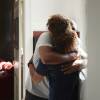The Boston Marathon bombing took the lives of three people, injured hundreds and changed the city forever. But what if it could have all been prevented? That's the question at the center of a new three-part Hulu docuseries, The Murders Before the Marathon, which looks at the connection between the bombings and a 2011 triple homicide in Waltham, which remains unsolved. The series focuses on Susan Zalkind, a local journalist who investigated the crimes. She joined GBH's Morning Edition hosts Paris Alston and Jeremy Siegel to talk about the unsolved murders. The following transcript has been edited for clarity.
Jerermy Siegel: Susan, you have a personal connection in all of this. Tell us about how following this story started for you.
Susan Zalkind: I started at the newsroom at NECN. I was fresh out of college. I was a freelance overnight production assistant, and a strange murder case [came] across the wire: three men found with their throats slit, marijuana on the bodies, cash left behind. I had never heard of a homicide like this. And at first, I was intrigued. I wanted a career in journalism. I started reaching out, digging into this, and then I found the victims' names. And one of those men was my friend, Erik Weissman.
Paris Alston: Sorry to hear that, Susan.
Zalkind: Thank you. My life kind of screeched to a halt. I still thought this was an extremely unusual murder, and I was confused as to why there wasn't more media interest — why law enforcement seemed to be downplaying the horrific, unusual nature of this crime. But at the same time, I was grieving a loss. I started to question my instincts, and I had taken a step back from journalism.
And then there's this horrific explosion on the Boston Marathon finish line and Tamerlan Tsarnaev, who you know, was one identified as one of the Boston Marathon bombers. Tamerlan was close friends with Brendan Mess. There were three people killed in that apartment: Erik Weissman, Brendan Mess and Rafael Teken. So after Tamerlan Tsarnaev was identified, the big question was, could Tamerlan have been involved in this open murder case? But there was no evidence linking the two. I made it my mission to answer those questions because it seemed that I wasn't going to get them from anywhere else.
Siegel: So what answers have you found? Do you feel like you've found that the connection is there?
Zalkind: Yes, but these answers should not come from me. I'm a friend of the victim. I'm an investigative journalist. And I stand by my reporting. We worked with ABC News Studios Story Syndicate. But these answers shouldn't come from me. They should come from law enforcement, the system, governance. And so while I do believe I've solved a murder case, that's not really to congratulate myself. This is in no way resolved.
Alston: So to that point, what do you think could have been done differently in law enforcement's investigation into this incident? And what do you hope that they take notice around the work that you've been doing?
Zalkind: One of the the main findings first reported by The New York Times was that Tamerlan Tsarnaev's name was provided to law enforcement. The New York Times reported that Tamerlan wasn't questioned. But I also found that Brendan Mess, who had been sparring partners with Tamerlan Tsarnaev — and you have to think about the physicality required to slit one person's throat, let alone three. And here we have Brendan Mess, who has a purple belt in Jitsu. How do you take these men down? Brendan Mess goes to the gym, trains in MMA, several days a week. Wouldn't you as an investigator, go to the gym? Maybe ask around. I think the question that I have is, isn't it time we maybe look back at what happened and think about what could possibly have been done better?
Siegel: Tell us about your process of looking back. You've mentioned your personal connection to this case. What was it like to relive that in a way over the years? And also, I think some people who watch this series, who are listening to this conversation now might have those questions that often come up with journalistic situations of the reporter being too close to the story. What's it been like for you reporting on this story?
"Isn't it time we maybe look back at what happened and think about what could possibly have been done better?"-Susan Zalkind
Zalkind: I think someone else should be looking into this. It was incredibly emotionally taxing. I would have loved for someone in law enforcement to take this on. I would have loved for somebody else in the media to have taken this story on. But that didn't happen. I think that is part of my personal connection to Erik. We disclosed that in the series as well as some personal information about my life, which while I'm shy, it makes me a little vulnerable; it's also important to keep to to disclose to viewers, readers about what that connection was.
Siegel: Do you think the marathon bombing could have been prevented if this case were treated differently?
Zalkind: Yes. Investigators [were] provided Tamerlan Tsarnaev, his name. Tamerlan Tsarnaev did it. He killed those three men. Tamerlan Tsarnaev was arrested on a murder charge. The Boston Marathon bombing would never have happened. Dzhokhar Tsarnaev would likely have been some name no-name mop headed stoner at UMass Dartmouth. And as I'm diving into this case, I'm looking at how Tamerlan Tsarnaev was radicalized. I'm looking at all the conspiracy theories that arose because there was no answers about this case and that could not be the legacy. That was left behind.
Zalkind's work is ongoing. She's actively pursuing records and documents from Middlesex County related to the case. Her forthcoming book, The Waltham Murders, will be out next year.









